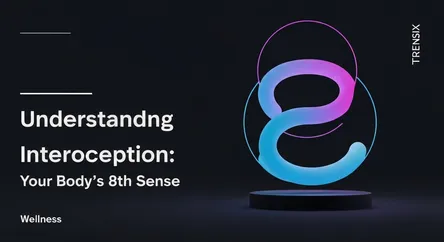Wellness
Understanding Interoception: Your Body's 8th Sense

Discover interoception, the hidden sense that monitors your internal world. Learn how tuning into your body's signals can improve your well-being.
What is it?
Interoception is considered our eighth sensory system, responsible for sensing the internal state of our body. It’s how we notice and interpret signals like a growling stomach, a racing heart, tense muscles, or a full bladder. This sense is constantly working to collect information about our internal organs and skin, helping the brain answer the fundamental question, "How do I feel?". It allows us to distinguish between feelings like hunger, thirst, pain, anxiety, and sadness by paying attention to our body's cues.
Why is it trending?
Once an obscure term, interoception has become a hot topic in neuroscience and wellness. This surge is due to growing research linking it directly to mental health, emotional regulation, and decision-making. As mindfulness and the mind-body connection gain mainstream traction, people are increasingly interested in how their internal awareness impacts their overall health. Experts recognize that improving our connection to our body's signals is foundational for well-being, leading to a rise in interoception-focused practices like yoga and meditation.
How does it affect people?
Interoception is vital for self-regulation. When you notice you're cold and put on a jacket, or feel your chest tighten with anxiety and take deep breaths, you are using interoception. Poor awareness of these signals is linked to conditions like anxiety, depression, eating disorders, and autism. It can make it difficult to manage emotions or even identify basic needs. By contrast, enhancing interoceptive awareness can lead to better emotional control, reduced anxiety, and a stronger sense of connection to oneself, improving overall health and wellness.